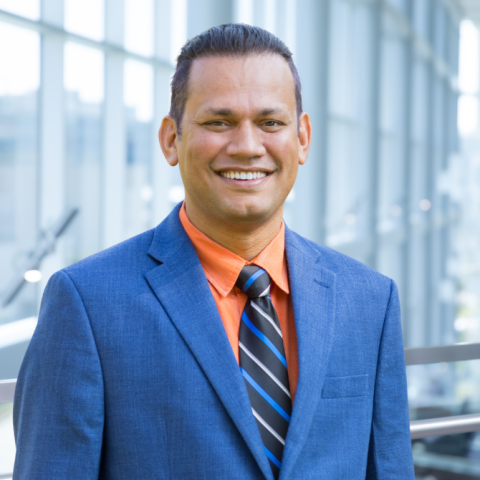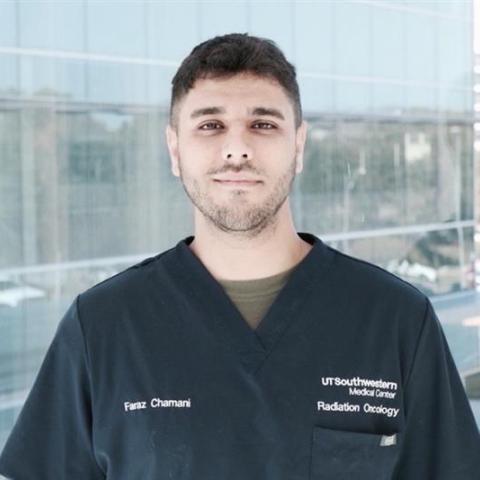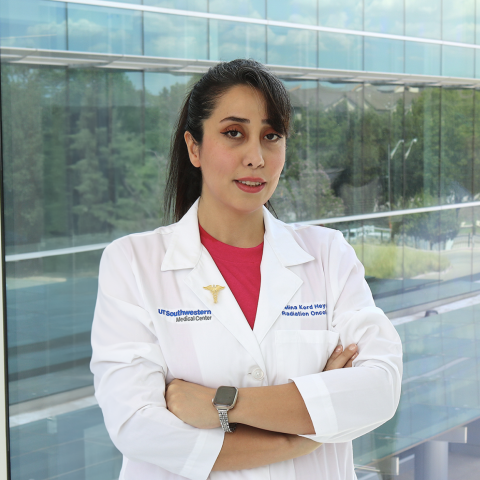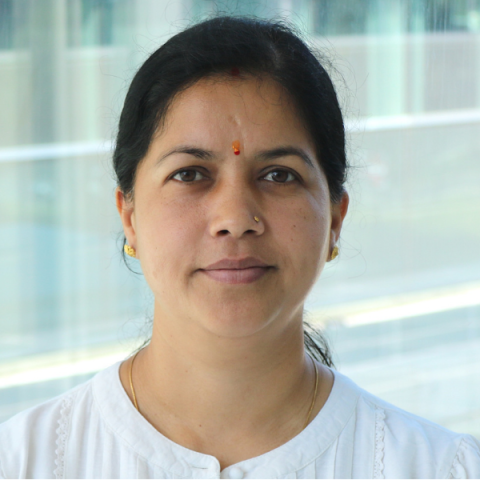
Ashish Ranjan, B.V.Sc., Ph.D., Principal Investigator
Dr. Ranjan is an Endowed Professor in the Department of Radiation Oncology. He also serves as Vice Chair for Comparative Oncology and Research Innovation and Director of the Veterinary Research and Oncology Clinic. He earned his B.V.Sc. degree (DVM equivalent) from Madras Veterinary College, in Chennai, India, followed by a Ph.D. in biomedical and veterinary sciences from Virginia Tech. Dr. Ranjan was then a visiting fellow at the Center for Interventional Oncology, Department of Radiology and Imaging Sciences at the National Institutes of Health (NIH).
Dr. Ranjan's research interests are in the application of device-directed nanoparticles for solid tumor chemo-immunotherapy. His lab is actively engaged in preclinical and bench-to-bedside veterinary clinical trials and has received funding from several federal, state, and private sources. Dr. Ranjan has received several distinguished awards, including the NIH Merit Award. He also serves on the Scientific Advisory Board of Focused Ultrasound Foundation, UK's Humanimal Trust, and NIH panels.
Postdoctoral Researchers

Faraz Chamani, Ph.D., Postdoctoral Researcher
Dr. Faraz Chamani earned his Ph.D. in electrical and computer engineering from Kansas State University in 2023. His research focused on in vitro measurement and mathematical modeling of hyperthermia-induced bioeffects in pancreatic cancer cells, contributing to the development of modeling tools for predictive treatment planning of thermal therapies and furthering understanding of the effects of energy-based interventions that involve perturbation of tissue temperature.
Dr. Chamani gained industry experience as a R&D radiofrequency engineer at Varian Medical Systems in Austin. During his one-year tenure, he expanded his technical engineering skills and computational modeling expertise, particularly in finite element analysis (FEA) in minimally invasive thermal ablation for cancer treatment. During this time, Dr. Chamani contributed to the development of a microwave thermal ablation system for the treatment of liver tumors.
With extensive research and industry experience in energy-based thermal ablation modalities, Dr. Chamani has published his work in peer-reviewed journals. Currently, as a postdoctoral researcher, his work focuses on optimizing high-intensity focused ultrasound (HIFU) as a novel non-invasive therapeutic approach for cancer treatment. This includes both thermal ablation and non-thermal histotripsy techniques, with a particular emphasis on designing personalized treatment protocols for canine cancer patients.
Siva Dallavalasa, Ph.D., Postdoctoral Researcher
Dr. Siva Dallavalasa is currently a postdoctoral researcher on an NIH-funded project under the supervision of Dr. Ashish Ranjan. In 2014, he completed his bachelor's degree in pharmacy at Acharya Nagarjuna University College of Pharmaceutical Sciences, Guntur, followed by a master's degree in pharmacology at Andhra University College of Pharmaceutical Sciences, Visakhapatnam, Andhra Pradesh, India.
His master's dissertation was done under the supervision of Dr. Nishanth Jain, Principal Scientist, Department of Applied Biology, CSIR-IICT, Hyderabad, Telangana, India; his doctoral studies were done under the supervision of Dr. MVSST SubbaRao and Dr. Ravindra P. Veeranna at JSS-AHER, JSS Medical College, Mysore, India. As a doctoral researcher, Dr. Dallavalasa worked on screening and identification of molecular and therapeutic benefits of anti-hyperglycemic drugs as anti-cancers, primarily on breast cancers.
Ph.D. Students

Mina Kord Heydari, Ph.D. Student
Mina Kord Heydari is a Ph.D. student in the Cancer Biology Program. She earned her bachelor’s and master’s degrees in food science and technology engineering from Golestan Institute of Higher Education, where she specialized in nanomedicine. Her master’s thesis centered on developing nanoparticle-based drug delivery systems, highlighting her expertise in nanotechnology. Currently, Mina is integrating her engineering background with cancer biology to develop novel nanomedicine-based therapeutic strategies aimed at enhancing targeted cancer treatments and improving patient outcomes. She is passionate about advancing oncology through innovative research and interdisciplinary collaboration.
Sri Vidhya Chandrasekar, Ph.D. Student
Sri is a second-year Ph.D. student in the Department of Radiation Oncology at UT Southwestern. She graduated from Tamil Nadu Veterinary and Animal Sciences University (TANUVAS), Chennai, India, and holds a bachelor's degree in veterinary science and animal husbandry. Her research focuses on combining nanomedicine with therapeutic ultrasound to enhance the effectiveness of immunotherapies targeting solid tumors.

Roy Garcia, Ph.D. Student
Roy is in the Cancer Biology program and MODTS track at UTSW and is an HHMI Gilliam Fellow. He graduated from the University of California, Santa Barbara with a B.S. In biochemistry and molecular biology. He is extremely passionate about improving therapeutic options for late-stage cancer patients. His research focuses on the intersection of nanomedicine, tumor and immune cell metabolism, and structural biology to enhance immunotherapy efficacy in solid tumors. Furthermore, this work will also be explored in combination with existing therapies such as therapeutic ultrasound and radiation.

Ray Pantoja, Ph.D. Student
Staff

Shanti Choudhary, Ph.D., Senior Researcher
Shanti Choudhary earned a Ph.D. in animal science from Rohilkhand University, Bareilly, India, and completed her research work at the Central Avian Research Institute, Bareilly. She did her Master of Science in biotechnology from Kumaun University, Nainital, India. Dr. Choudhary’s research career is versatile and interdisciplinary, including cell biology, molecular biology, biotechnology, infectious diseases, stem cell biology, metabolic diseases, and translational medicine.
Before joining Dr. Ranjan’s laboratory, Dr. Choudhary was a Research Assistant at the Centre for Translational Research and Education (CTRE), Loyola University Chicago (Jan – Aug 2025). Her recent work at Loyola was focused on exploring the mechanism for gut immunity and sepsis-induced multi-organ failure.
Before this, Dr. Choudhary was engaged in teaching and extensive research activities for four years (2020-2024) at the Guru Angad Dev Veterinary and Animal Sciences University, Punjab, India, where she taught various courses in animal biotechnology to undergraduate and postgraduate students. Dr. Choudhary is also associated with the development and evaluation of the therapeutic potential of canine stem cells and their secretome in wound healing. She was also involved in the development of TaqMan/qPCR-based early and sensitive diagnostics for the African swine fever virus. She served as CEO of a startup company exploring the development of cell-based natural therapeutics and regenerative medicine for two years.
Tanmayee Chikate, M.S., Research Assistant
Tanmayee earned her master's degree in biomedical engineering from The University of Texas at Dallas, where her coursework included cancer biology, nanosensors, CRISPR, and medical devices. She previously completed an integrated M.Tech. in Biotechnology at Dr. D. Y. Patil Biotechnology and Bioinformatics Institute, Pune. Her master’s thesis, conducted during an internship at IIT Mumbai, focused on the design of integrin-targeted nanoparticles for photothermal cancer therapy and was titled "RGD Conjugated Gold Nanoshell Polymer Nanoparticles for Cancer Therapy."
Tanmayee's academic foundation is enriched by her role as a STEM graduate teaching assistant where she taught courses on nano-biomaterial interactions and polymer biocompatibility while mentoring students in laboratory techniques and experimental design. Her expertise spans nanoparticle synthesis, drug delivery optimization, and molecular biology. Her previous work includes designing polymeric nanoparticles and graphene quantum dots for cancer theranostics, engineering lymph node mimetics to study metastasis, and developing nanoparticle systems to delay cardiovascular aging by targeting inflammatory T-cells. She has extensive skills in nanoparticle characterization, mammalian cell culture and cell-based assays.
Currently, she is advancing research on nanoparticles for gene delivery and hyperthermia-triggered drug release to enhance immunotherapy by promoting macrophage-mediated tumor cell phagocytosis. This work aims to improve therapeutic precision while minimizing off-target effects. Tanmayee aspires to develop innovative strategies in targeted drug delivery and immunotherapy to improve cancer treatment outcomes by identifying and validating novel therapeutic targets.
